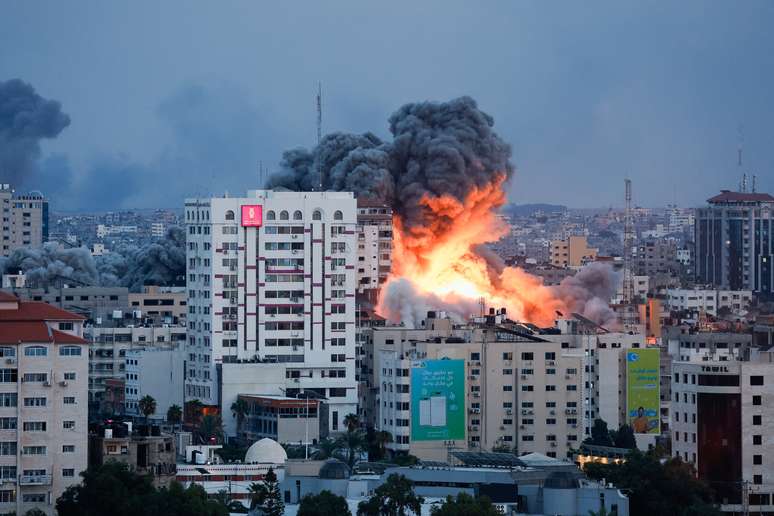The Israeli army reported that its forces were involved in fighting Hamas incursions in eight locations; There was also an exchange of attacks with the Lebanese group Hezbollah
TEL AVIV, Israel – Israeli soldiers fought against fighters from Hamas on the streets of the south Israel on Sunday 8th and launched retaliatory attacks that razed the buildings to the ground Gazawhile in northern Israel there was a brief exchange of attacks with the militant group Hezbollah From Lebanon growing fears of wider conflict in the region.
The fighting continued for more than 24 hours after a unprecedented surprise attack from Gaza, where Hamas fighters, supported by a hail of thousands of rockets, broke through the Israeli security barrier and invaded nearby communities. The fighters have brought prisoners to the coastal enclave of Gaza, including women, children and the elderly, who they are likely to try to exchange for thousands of Palestinian prisoners held by Israel.
Israeli Prime Minister Benjamin Netanyahu has declared that the country is at war and that he will exact a high price from his enemies. Hamas leaders said they were prepared for further escalation.
The Israeli army spokesman said that all residents living in towns near the Gaza border fence would be evacuated within 24 hours. “We will reach every city until we kill every terrorist within Israel’s parameters,” Daniel Hagari said.
#BREAK: Mortars were reportedly launched from #Lebanon in the areas of Chebaa Farms and Kfar Chouba, hitting a military position. Immediately afterwards #Israel responded with its own bombs along the edges of the area. #لبنان #إسرائيل pic.twitter.com/SJYHic4mcm
—Nicholas Frakes | نيكولاس فريكس (@nicfrakesjourno) October 8, 2023
Israeli media said this, citing defense service officials at least 300 people were killedincluding 26 soldiers, while in Gaza, authorities said 313 people had died. An Israeli military officer said hundreds of militants had been killed and dozens captured.
The civilian population paid a very high price for the violence on both sides. Israeli television news broadcast a series of accounts of families of captive or missing Israelis, crying and pleading for help in a fog of uncertainty about the fate of their loved ones. In Gaza, residents have fled their homes near the border to escape Israeli attacks.
Previous conflicts between Israel and Hamas leaders in Gaza have led to widespread destruction in Gaza and days of rocket fire on Israeli cities. Now the situation is potentially more volatile, with Israel’s far-right government hamstrung by an unprecedented security breach and the Palestinians desperate over the endless occupation of the West Bank and suffocating blockade of Gaza.
The explosion on Israel’s northern border also threatened to drag Hezbollah, a fierce enemy of Israel backed by Iran and estimated to have tens of thousands of rockets, into battle. On Sunday, Hezbollah fired dozens of rockets and projectiles at three Israeli positions in a disputed area along the border, and the Israeli army responded using armed drones.
Rear Admiral Daniel Hagari, an Israeli military officer, told reporters that the situation on the northern border was calm after the exchange of attacks. But he said fighting continues to rage in the south and that there are still hostage situations.
The official said troops had moved into all communities near the Gaza border, where they planned to evacuate all civilians and search the area for any remaining militants. Hagari said the army has killed 400 militants since the war began and captured dozens more.
“We will go through all the communities until we kill all the terrorists who are on Israeli territory,” he said. In Gaza, “every terrorist who is in a house, every commander in the house, will be hit by Israeli fire. This escalation will continue to increase in the coming hours.”
Hamas said it continued to send forces and equipment to “several locations within our occupied territories” overnight, referring to Israel.
Saturday’s surprise attack was the bloodiest against Israel in decades. In an attack of astonishing scale, Hamas gunmen used explosives to breach border barriers surrounding Gaza, and then crossed the border in motorcycles, pickup trucks, paragliders and speedboats along the coast. They entered 22 locations outside the Gaza Strip on Saturday morning, including towns and other communities within 15 miles of the Gaza border, as Hamas fired thousands of rockets into Israeli cities.
Israeli media reported that at least 300 people were killed and 1,500 wounded in Saturday’s attack. Hamas fighters have brought an unknown number of civilians and soldiers into Gaza, and a line of Israelis with missing family members has snaked outside a police station in central Israel to provide investigators with DNA samples and other means that could help to identify family members.
According to the military, Israel hit 426 targets in Gaza, destroying residential buildings in giant explosions. Among them was a 14-story tower housing dozens of Hamas apartments and offices in central Gaza City. Israeli forces issued a warning shortly before.
According to the Palestinian Ministry of Health, among the 313 dead in Gaza there are 20 children and around 2,000 injured. UNRWA, the United Nations agency for Palestinians, said more than 20,000 Palestinians had left the Gaza border region to go deeper into the territory and take refuge in United Nations schools.
In a televised address on Saturday evening, Israeli Prime Minister Benjamin Netanyahu said the military would use all its forces to destroy Hamas’ capabilities. “All the places where Hamas hides, where it operates, we will turn them into ruins,” he added.
“Get out of there now,” he told Gazans, who have no way to leave the small, overcrowded Mediterranean territory. Gaza’s 2.3 million people have been under a border blockade, imposed at various levels by Israel and Egypt, since Hamas militants took control in 2007.
The big question now is whether Israel will launch a ground attack on Gaza, an action that has caused rising death tolls in the past. Netanyahu vowed that Hamas “will pay an unprecedented price.” But, he warned, “this war will take time. It will be difficult.”
The Israeli army says it is bringing four divisions of troops and tanks to the Gaza border, joining 31 battalions already in the area.
Hamas said it planned a long battle. “We are prepared for all options, including all-out war,” Hamas deputy head of the political bureau, Saleh al-Arouri, told Al-Jazeera television. “We are ready to do whatever is necessary for the dignity and freedom of Hamas.”
The abduction of Israeli civilians and soldiers has also raised a particularly thorny issue for Israel, which has a history of highly lopsided deals to bring captive Israelis home. Israel holds thousands of Palestinians in its prisons. The army confirmed that a “substantial” number of Israelis were abducted on Saturday, without giving an exact number.
An Egyptian official said that Israel had asked Cairo for help in ensuring the safety of the hostages and that the head of Egypt’s intelligence service had contacted Hamas and the smaller but more radical Islamic Jihad group, which took part in the raid, to obtain information. In the past, Egypt has often played a mediator role between the two sides.
The official said Palestinian leaders say they do not yet have a “full picture” of the hostages, but that those taken to Gaza have been taken to “safe locations” across the territory.
“Of course they are numerous, several dozen,” said the official, who asked not to be identified because he was not authorized to provide information to the press.
Egypt has also spoken to both sides about a potential ceasefire, but the official said Israel was not open to a truce “at this stage.”
The leader of Hamas’ military wing, Mohammed Deif, said the attack was a response to the 16-year blockade of Gaza and a series of recent incidents that have brought Israeli-Palestinian tensions to a fever pitch.
Over the past year, Israel’s far-right government has increased settlement construction for Jewish settlers in the occupied West Bank, violence by Israeli settlers has displaced hundreds of Palestinians, and tensions have risen around the Al-Al-Mosque. Aqsa, a holy site in Jerusalem.
Deif, who did not appear in public, said in a recorded message that the attack was just the beginning of what he called “Operation Al-Aqsa Storm” and called on Palestinians in East Jerusalem and northern Israel to join the fight.
In Gaza, much of the population was left in the dark Saturday night as Israel cut electricity. Netanyahu’s office said in a statement that Israel would stop supplying electricity, fuel and goods to Gaza.
Before dawn on Sunday, militants fired more rockets from Gaza, hitting a hospital in the Israeli coastal city of Ashkelon. The army said patients had been evacuated before the attack.
Classes have been canceled across the country.
US President Joe Biden said from the White House that he had spoken to Netanyahu to say that the United States “stands with the people of Israel in the face of these terrorist attacks”. Israel has the right to defend itself and its people, period.”
Hamas’ incursion on Simchat Torah, a Jewish holiday, evoked painful memories of the 1973 Middle East war, in which Egypt and Syria launched a surprise attack on Yom Kippur, the holiest day in the Jewish calendar, with the aim of to reconquer the occupied territories. from Israel. The comparison has strengthened criticism of Netanyahu and his far-right allies, who have campaigned as security hawks.
The attack comes at a time of historic division in Israel over Netanyahu’s proposal to overhaul the justice system. Mass protests against the plan have brought hundreds of thousands of Israeli demonstrators into the streets and led hundreds of military reservists to shun voluntary service – riots that have raised fears about the armed forces’ battlefield readiness.
Source: Terra
Rose James is a Gossipify movie and series reviewer known for her in-depth analysis and unique perspective on the latest releases. With a background in film studies, she provides engaging and informative reviews, and keeps readers up to date with industry trends and emerging talents.






